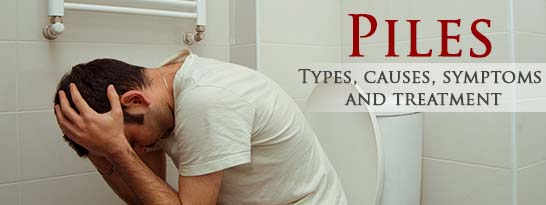Piles
Hemorrhoids, also called piles, are swollen veins in your anus and lower rectum, similar to varicose veins. Hemorrhoids have a number of causes, although often the cause is unknown. They may result from straining during bowel movements or from the increased pressure on these veins during pregnancy. Hemorrhoids may be located inside the rectum (internal hemorrhoids), or they may develop under the skin around the anus (external hemorrhoids).
Causes
The veins around your anus tend to stretch under pressure and may bulge or swell. Swollen veins (hemorrhoids) can develop from increased pressure in the lower rectum due to:
- Straining during bowel movements
- Sitting for long periods of time on the toilet
- Chronic diarrhea or constipation
- Obesity
- Pregnancy
- Anal intercourse
- Low-fiber diet
Symptoms
Signs and symptoms of hemorrhoids may include:
- Painless bleeding during bowel movements — you might notice small amounts of bright red blood on your toilet tissue or in the toilet
- Itching or irritation in your anal region
- Pain or discomfort
- Swelling around your anus
- A lump near your anus, which may be sensitive or painful (maybe a thrombosed hemorrhoid)
Hemorrhoid symptoms usually depend on the location.
Internal hemorrhoids. These lie inside the rectum. You usually can’t see or feel these hemorrhoids, and they rarely cause discomfort. But straining or irritation when passing stool can damage hemorrhoid’s surface and cause it to bleed.
Occasionally, straining can push internal hemorrhoid through the anal opening. This is known as a protruding or prolapsed hemorrhoid and can cause pain and irritation.
External hemorrhoids. These are under the skin around your anus. When irritated, external hemorrhoids can itch or bleed.
Thrombosed hemorrhoids. Sometimes blood may pool in external hemorrhoid and form a clot (thrombus) that can result in severe pain, swelling, inflammation and a hard lump near your anus.
Homeopathic Treatment
Homeopathic medicines are very effective in the management of piles and the symptoms associated with it such as pain, bleeding, itching, etc. The point to be emphasized is that the relief of symptoms is obtained with absolute gentleness and without invasion or surgery of any kind. Moreover, the condition has high relapse rate following surgical treatment, since surgery does not target the root causes of genetic tendencies, habitual constipation, etc. Homeopathic medicines work at the root level and can modify these genetic tendencies thus reducing chances of relapse and recurrence of the condition significantly. Grade 1 and 2 of internal piles treatment can be significantly helped with homeopathy. Grade 3 piles can find some relief of symptoms with homeopathy but may not be completely cured. Grade 4 piles can get symptomatic relief with medicines.

